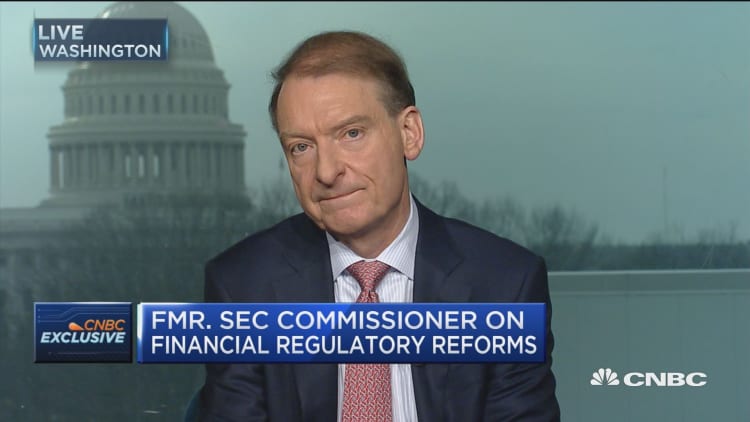
A provision tucked into the 2010 Dodd-Frank Wall Street Reform law requiring companies to release a ratio of CEO compensation versus median worker pay has nothing to do with preventing the next financial crisis, said Paul Atkins, former SEC commissioner and President Donald Trump's leading advisor on financial regulations.
In a continuation of actions aimed at reducing business regulations, Trump on Friday signed an executive order directing the Treasury Department and other regulators to review actions taken under the post-2008 crisis Dodd-Frank framework, including the Volcker rule, and deliver a report on which ones work and which ones don't work, within 120 days.
The CEO-worker pay ratio "was thrown in there at the behest of special interests," Atkins told CNBC's "Squawk on the Street" on Tuesday. "To have social aspects come into SEC disclosure policy is not the best way to run that agency or the disclosure system."
After long delays and opposition from corporate America, the Securities and Exchange Commission in August 2015 approved the rule in a 3-to-2 vote.
"The SEC chose one of the most burdensome ways of implementing that provision. So it's very costly for companies, especially international ones with lots of different employees to comply with," said Atkins, who served as SEC commissioner from 2002 to 2008 during George W. Bush's presidency. Atkins is currently CEO of compliance consulting firm Patomak Global Partners.
As a member, Atkins attended Friday's White House meeting of the President's Strategic and Policy Forum, chaired by Blackstone Chairman and CEO Steve Schwarzman. JPMorgan Chairman and CEO Jamie Dimon and BlackRock Chairman and CEO Larry Fink, also forum members, were in attendance as well.
In a second financial-related action on Friday, in the form of a presidential memo, Trump directed the Labor Department to delay implementation for the next 90 days and conduct a review of the so-called fiduciary rule, designed to prevent conflicts of interest when financial advisors give retirement advice.
In CNBC interview Friday, White House National Economic Council Director Gary Cohn said the fiduciary rule, set to go into effect this spring, was "completely misintended."
Cohn, formerly the No. 2 executive at Goldman Sachs, told "Squawk on the Street" that the rule does not protect investors, and in fact, limits their choices.


